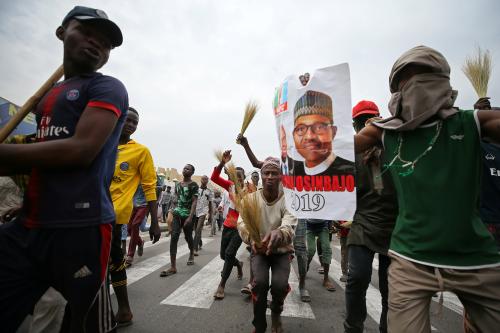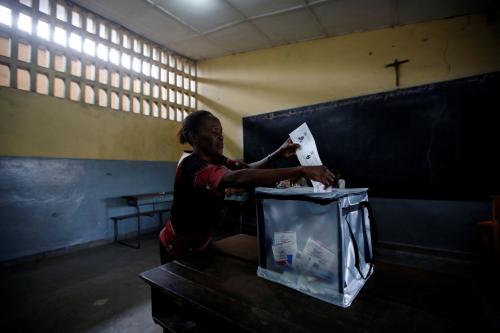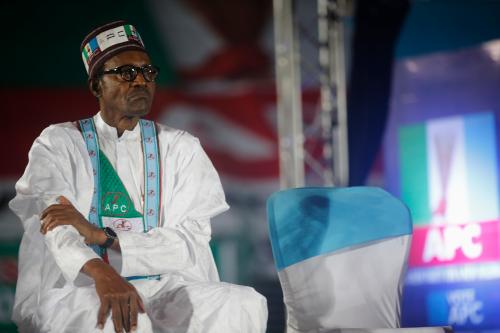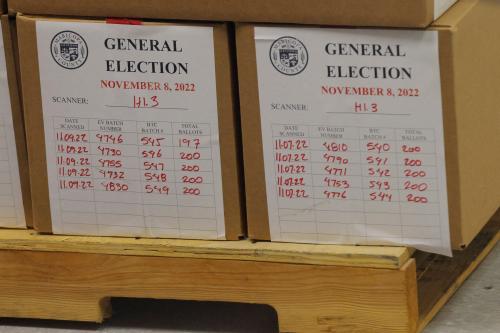Millions of Nigerians went to the polls between March 28 and 29 to cast votes for a president in what has been billed as the most important election in that country since the return of democratic governance in 1999. Although there were 14 candidates for the presidency, the real contest was between the incumbent President Goodluck Jonathan of the People’s Democratic Party (PDP) and General Muhammadu Buhari of the All Progressives Congress (APC) party. In addition to being the most competitive election in Nigeria since independence, the election was held amid rising tensions in the country on account of terror attacks by Boko Haram. There has been increasing tension between the north and the south due to what northerners consider a “lost turn” for the presidency and continued economic marginalization of their region. All these factors have tended to exacerbate traditional ethnic, regional, and religious fractures that have defined Nigerian politics since independence. As such, leading up to the election, there were widespread fears that it would be marred by violence. Although there were some incidences of violence, the elections were remarkably peaceful, and Nigerians are to be congratulated for advancing democracy.
In this hotly contested election, all indications are that General Buhari will imminently be declared the winner and next president of Nigeria by the country’s Independent National Electoral Commission. The results released so far show that Buhari won with approximately 56.3 percent of votes against Jonathan’s 43.6 percent. Indeed, President Jonathan has called Buhari to concede the election. Unsurprisingly, voting patterns reveal the differences in the regions of support with Buhari dominating the northern states and Jonathan doing well in most southern states. However, Buhari also did reasonably well in some of southern states normally dominated by Jonathan’s party.
Given the advantages of incumbency, the win by Buhari reflects the widespread frustration among Nigerians with Jonathan’s rule especially his government’s failure to contain Boko Haram and also the increasing desperation by youth due to high joblessness. The high turnout in northern states also reflects the general feeling by northerners that it should be their turn to rule and also due to the perceived marginalization of the region. Importantly, Buhari is not new to leadership: He previously served as head of state between 1983 and 1985, having taken power in a military coup. Buhari follows in the footsteps of former President Olusegun Obasanjo who headed a military government between 1976 and 1979 and later was elected president in 1999.
The next government faces major challenges ahead. As noted, the country remains fractured along various dimensions of identity. These fractures have been a major hindrance to development in the country since independence, and the new government must prioritize tackling the sources of these fractures. In particular, the real and perceived marginalization of the north must be addressed through more fair allocation of resources and targeted investments to promote economic activities in the region. The government must deal firmly with Boko Haram else the terror groups will continue to gain momentum that may be extremely difficult to contain in the near future. Finally, the new government must continue to implement far-reaching economic reforms that are absolutely necessary to sustain high rates of economic growth necessary to create jobs for the millions of unemployed youth and also to fight the country’s deplorably high levels of poverty.
A peaceful and transparent election in Nigeria has implications to the advancement of democracy in Africa. As the most populous country and largest economy in Africa, Nigeria is the most important country on the continent and has the potential to influence developments not only in West Africa but, indeed, the entire continent. Transparent elections will strengthen the country’s leadership role in the continent, both as an example of successfully resolving conflicts and as a stalwart against undemocratic transitions. In addition, entrenchment of democracy in Nigeria is bound to translate into better economic performance with positive spillover effects to other countries.
Finally, Nigeria deserves increased support from the international community. In a previous posting, I made the case for a visit to Kenya, Ethiopia and Nigeria by President Obama before he leaves office. Now that the president has announced his visit to Kenya in July, he must consider going to Nigeria as well. The conduct of what was generally peaceful and transparent election strengthens the case for a visit by President Obama. The international community should increase support for the new Nigerian government in its efforts to eradicate Boko Haram. With improved governance and security, Nigeria should be an ideal recipient of increased foreign direct investment flows: Thus, the election opens opportunities for U.S. firms to increase investment in the country.






Commentary
Nigeria 2015 presidential election: Significance and challenges ahead
March 31, 2015